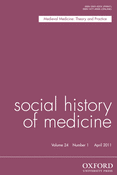-
Views
-
Cite
Cite
Projit Bihari Mukharji, Ishita Pande, Medicine, Race and Liberalism in British Bengal: Symptoms of Empire, Social History of Medicine, Volume 24, Issue 1, April 2011, Pages 182–183, https://doi.org/10.1093/shm/hkr014
Close - Share Icon Share
Extract
This monograph is a refreshing attempt to break with the contemporary trend within South Asian medical history of moving away from the study of state medicine. The attempt to cross-fertilise medical history with the emerging critiques of liberalism is also commendable. Ishita Pande's ambition is to use medicine as a ‘fruitful archive for the analysis of the relationship between the colonial state and its modern subjects’ (p. 1). Beginning with the familiar question of ‘what is colonial about colonial medicine?’ (‘the problem of difference’), she categorically ‘refuses to focus primarily on the difference between the colonial and the modern’ (p. 6). This allows her to explore the ‘reconciliation of modernity and colonialism’ (p. 8), thus enabling two manoeuvres. First, ‘the silenced term of race’ is ‘restored … from the domain of family secrets to the realm of history’ (p. 9). Second, the colonial state is seen as a biopolitical state. It is, Pande argues, the erasure of ‘race’ from the historiography of the colonial state in South Asia that has allowed its continued figuration as a state where the universal normalising tendencies of modern power remained inchoate. Instead, ‘race’ and its intertwining with liberalism (understood as ‘an activity’, not an ideology, p. 13) allowed the universalism of modern medicine to co-exist and even constitute the regimes of exclusion engendered by colonialism. The final component of Pande's argument is that the biopolitical nature of this power led to its normalising trends ‘being seized by the Bengali [sic] as a form of modern self-expression’ (p. 14). This threefold argument is worked out and demonstrated in four parts comprising a total of six chapters, an introduction and an epilogue.




